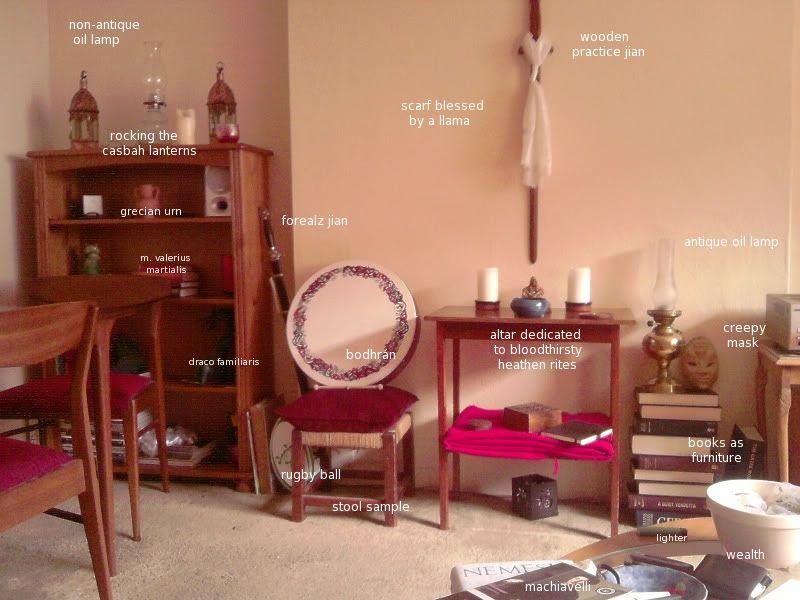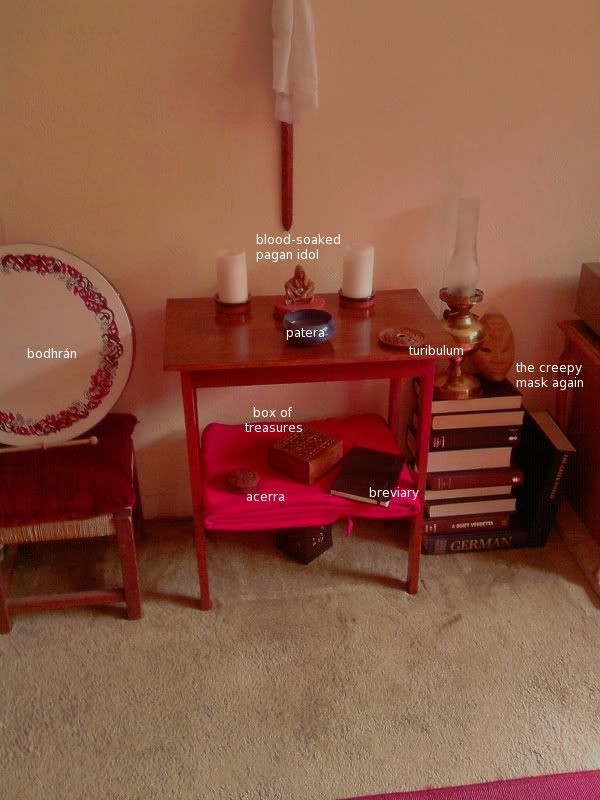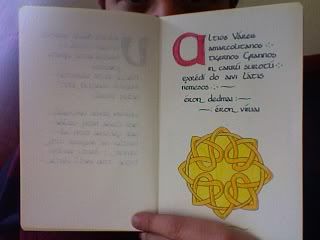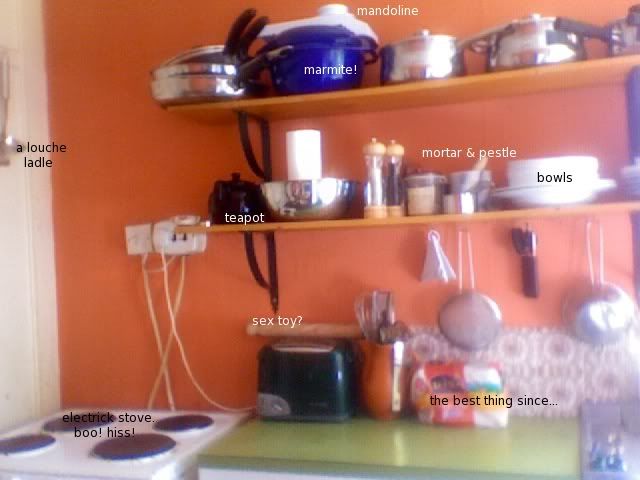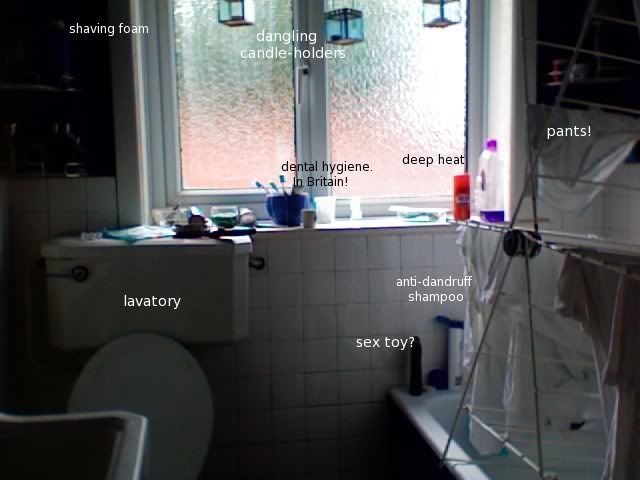Creddū dū U̯irūi, trebnā ad·i̯o aget bitun canti dedmin cou̯arin.
I believe in Truth, the order which animates the world according to the sacred laws.
"Truth" is an incredibly important concept among Indo-European peoples. Witness the Zoroastrian dualism between aša "Truth" and druj "Lie" or the Vedic concept of ṛta, which became dharma in later Hinduism. Closer to home, we have the Irish concept of fír flathemon "the ruler's truth", without which the land will wither and die. It should be clear, of course, that I am not talking of common or everyday "truth" here, such as one might tell when owning up to eating the last of the biscuits. Rather, I am talking about Truth as a fundamental force of reality itself. The Sanskrit adjective meaning "true", satyá-, is derived ultimately from the present participle of the Proto-Indo-European root *h1es- "to be" (as is the sooth- in English "soothsayer"): etymologically then, for the Indo-Europeans Truth was simply "that which is". Truth is not a statement about reality, but an expression of reality itself.
I am no philosopher: I simply do not have the intellectual toolbox to describe concepts like this accurately or adequately. Honestly, I rather feel like a fool grubbing about with pebbles in a darkened cave trying to explain mountains. As such, this is all rather ignotum per ignotius. Ultimately, however, this concept is probably best explained with a cosmogonic aside. There are two forces or principles at play in the world, which we might term "order" and "chaos". Although we have a natural inclination to think of order as "good" and chaos as "bad", it should be pointed out that the they are mutually interdependent and devoid of what we might perceive as moral qualities. Order without chaos does not grow, becomes still, brittle and dead. Chaos without order is growth unchecked: cancer. The maintenance of the cosmos relies on both principles. Truth then is the regulated interplay between order and chaos: the harmony between them which animates the cosmos.
In the ancient Greek world, the followers of Pythagoras refined what has been called the "triadic principle". Quoting the modern Pythagorean John Opsopaus: "it is based on the idea that there can be no meeting between opposites, and therefore, for there to be a Harmonia, or Union, of the opposites, there must be a Mean Term, which has something in common with each of the Extremes. The Mean Term both connects the Extremes, but also keeps them separate by occupying the gap between them. Therefore, as we will see, Mediating powers are also Separating powers." If chaos and order are the ultimate opposites, then the harmony or mean term between them is U̯iron "Truth", or ṛta, or aša. A rather more elegant and thorough exposition of this concept than mine can be found in the writings of Ceisiwr Serith, who refers to this concept as "the Xartus" (from PIE *h2értu-, from the same root as Sanskrit ṛta and Avestan aša). Not only is there an extended discussion in his book Deep Ancestors, but there is also a brief introduction on his website.
Metaphysical speculation aside, what are the quotidian implications of "believing in Truth"? As I believe that Truth permeates, underlies and animates the universe itself, I also believe that it does the same for my daily life. Truth, in being a mediator between order and chaos, is ultimately a relationship: the relationship if you like. As Emma Restall-Orr (in that book on ethics with the ghastly title) emphasises, human life is essentially all about relationships: with other humans, with gods, spirits, the universe itself, even the relationship one has with oneself. Believing in Truth exhorts me to integrity within all of those relationships: a striving to work with the harmony of reality rather than against it. As such, Truth is both the source and end of Virtue: I believe that living my life with integrity and in harmony with the truth (u̯indoraχtā) leads to u̯indobii̯on a blessed life.
Creddū dū Tribo Sucenetlobo: dēu̯oi, andēu̯oi, etic senisamones.
I believe in the Three Good Hosts, the gods, the non-gods and the ancestors.
A tripartite division of beneficent non-human beings into "gods, spirits and ancestors" also appears to be of Proto-Indo-European vintage. The ancient Greeks spoke of θεοί, δαίμονες καί ἥρωες "gods, daimones and heroes" (where "hero" should be understood in the context of a "founding ancestor"), and the Lebor Gabála Érenn speaks of dé, andé ocus duine "gods, non-gods and men". In Vedic India we see a typical multiplication of forms, giving devas, pitṛs, gandharvas, apsaras and ṛṣis: pitṛs "fathers" and ṛṣis "sages" are easily reductible to "ancestors", while gandharvas and apsaras are essentially gender-specific kinds of "nature spirits", which gives us the classical triad of "gods, spirits and ancestors".
The three groups are not wholly distinct, however. The division is not watertight: there is some degree of bleeding between them. For example, is Sabrina simply the tutelary spirit of the River Severn, or a goddess in her own right? Why not both? Similarly, Augustus died and was then worshipped by his people as a god: is he then an ancestor or a divinity? The Romans record that the Gauls believed themselves descended from "Dis Pater": deity or ancestor? Or again, perhaps both? The urge to categorise is a human trait, but it should be remembered that some things and concepts defy neat categorisation.
U̯edi̯ū Dēu̯ūs, sindoi anmaru̯ātou̯i̯oi, sindoi ratomāroi ernant·i̯o u̯esu̯ās, sindoi areu̯orātoi trebnās en tribo rīgi̯obo. Arcū ambi eson aneχtlūi, etic are aiton sagi̯ū emmi·i̯o eson coimos.
I worship the Gods, the undying, the beneficent, the givers of goods, guarantors of order in the three worlds. I entrust myself to their protection, and strive ever to be dear to them.
A fundamental characteristic of the Gods is that they are immortal: they do not die. In the myths, this immortality is frequently attributed to the consumption of special food or drink: the apples of Iðunn in Norse myth, in ancient Greece it was ambrosia (etymologically meaning "immortality"), while the Vedic gods owed their immortality to Soma. In Celtic myth, this function appears to have been fulfilled by the Smith-God's feast. The Gods are also Good. This does not necessarily mean "nice", or good in a way that is immediately apparent to us humans. What this means is that the Gods are fully "in tune" with the Truth, it is part of their nature: they "do not govern [Truth] so much as immanentalize it," quoting Terence Day. Both of these attributes are in contrast to humans: we are not immortal. We have to work at living according to Truth. So, what do the Gods do for us? The most universal epithet applied to the Gods throughout the Indo-European world is "givers of goods": they provide us with health, wealth, courage, good fortune and so on. They also stand between us and the forces which would disrupt the harmony of the universe.
(An aside: the trī rīgi̯ā "three worlds" alluded to in the text is a cosmological statement interpretable in a few ways. Either the classical Celtic triad of "land, sea and sky", or the frequent Eurasian cosmology of an "underworld, middle-world and over-world". In the latter, the underworld is the realm of the dead, the middle world the habitation of humanity and the over-world that of the gods.)
The Gods protect their followers. This much is evident throughout the myths. They do not exercise this protection indiscriminately and without favouritism, however. We have to hold up our end of the bargain as well: we have to entreat this protection, to bind ourselves to the gods with ties of reciprocity. We must strive to become dear to the Gods: to develop our relationships with them.
Aremoni̯ūr Andēu̯ūs, sindoi trougocaroi ambi·i̯o pellant biu̯otutās doni̯on ac ageson. Aidulegesi ac boutegesi, u̯orstūnābin ac magesi, ro·buu̯ont mon u̯reχtou̯es dū eson monē.
I offer reverence to the Ungods, the benevolent spirits who encircle the life of men and cattle. At the hearth and in the byre, at the door and in the fields, may they watch over my deeds.
The second category, the Ungods (andēu̯oi, Old Irish andé) is possibly the most problematic. Plato defined the Greek equivalent, the daimones as "supernatural beings between mortals and gods," which is as good an etic definition as any, leaving room as it does for a variety of types. In this category fall what are commonly referred to as the "spirits of place", the Roman numina and genius loci. Similarly, we can include here the lares and di penates, the guardian spirits of the home and the storecupboard. Closer to home, we might well speak of the tylwyth teg, the helpful fairies of Welsh folklore. It is possible that the matres and suleviae, attested to in inscriptions from Gaul and Britain were household spirits of this type.
Personally, I see them as the children of the earth goddess, in the same way that the Roman Tellus was associated with "Mater Larum", mother of the lares. In south Wales the tylwyth teg was also known as bendith y mamau, the "blessing of the mothers"- another connection to the matres. In another example of how these categories of supernatural beings can bleed into one another, it has been speculated that the Roman lares were in origin ancestral spirits.
In my personal practice, the most important of the andēu̯oi are the guardian of the threshold and the guardians of the storecupboard, both of whom are offered regular reverence at the new moon.
Moni̯ūr Senisamonās, mātres ac atres mon u̯eni̯ās. Sindoi trebant·i̯o en lissobi cintuatros, creddū ernant·i̯o pēllan ac concoron dū moi au andubnū. Ro·gnisām u̯indobii̯on canti senognāstās, canti adilon ateoinācī ac ategnātī.
I remember my Ancestors, the venerable progenitors of my family. Those who dwell in the halls of the first father, I believe that they offer me their wisdom and guidance from the otherworld. May I live a good life according to their customs, in the hope of reunion and rebirth.
Reverence for one's ancestors is seemingly universal throughout Indo-European religions: even Zoroastrianism reveres the spirits of the dead, albeit lightly disguised as the fravašis. The ancestors, I believe, watch over their descendants, offering their advice and the benefit of their experience: whether one wishes to see this as a combination of memory and family stories or actual communion with the dead. I also believe in reincarnation, that after death we are reunited in the Otherworld with those we have loved in life and subsequently take on new bodies in this world to live again.
Aside from reverence to these recent ancestors, I consider it a religious duty to find out as much as I can about the beliefs and customs of my more distant spiritual ancestors. That is the essence of reconstructionism: learning about the gods from the ancestors.
Arecrinū dūsi̯ūs, sindoi nāmantes selgant·i̯o orābi bitous, sindā gāu̯ā ro·i̯o slouχset albii̯on. Canti sudedmātan cantic u̯indoraχtan, ro·nertasātor U̯iron u̯rit sodesūs nāmantās.
I fear the evil spirits, the enemies who stalk the edges of the world, the Lie which would engulf the world. Through right sacrifice and a righteous life, may Truth be strengthened against them.
The final clause speaks not of a threat of hellfire, or of bogies to scare people into doing the right thing. In fact, it is in a way a statement of sacrificial theology.
Returning full circle again: the Pythagorean triadic principle states that everything has its opposite. Where there is the Truth, the harmony which animates the universe, there is also the Lie, which would see that harmony disrupted. I believe it is one of the highest duties of the believer to fight against this Lie, even as the Gods do themselves. One of the most powerful weapons in this fight is sacrifice. Aside from being a communal meal, shared between gods and humans and thus cementing reciprocal bonds of hospitality between them, a correctly performed sacrifice is a re-enactment of the primordial cosmic sacrifice which set the universe turning. With each sacrifice, the world is made anew: each sacrifice makes the world a better place, even in a small way: Truth is strengthened and the Lie is weakened.


